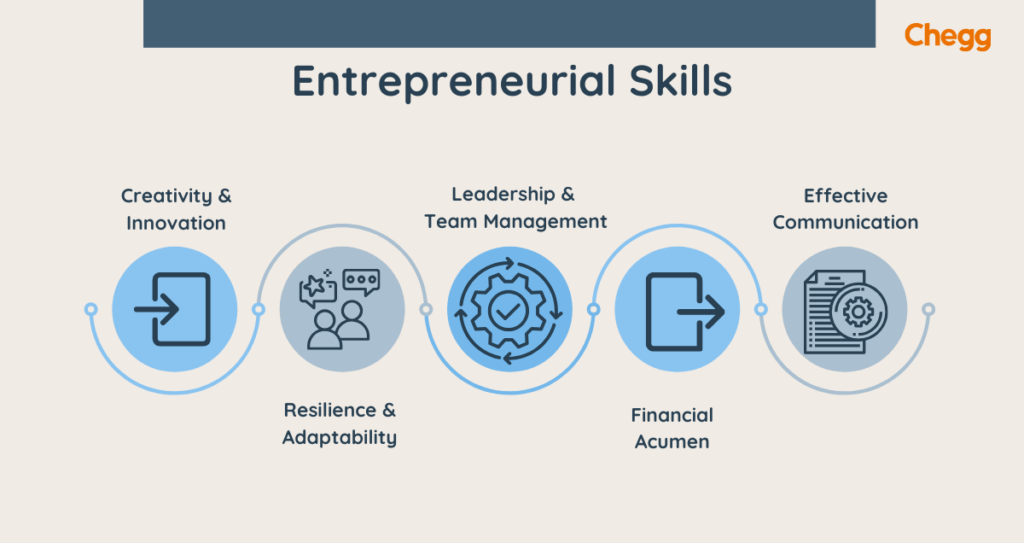
Quick Summary
Table of Contents
In today’s fast-paced and ever-evolving business landscape, possessing strong entrepreneurial skills is more crucial than ever. Whether you’re a budding entrepreneur or a seasoned business owner, honing these skills can significantly impact your success. This blog will explore the critical entrepreneurial skills you need, how to develop them, and why they are essential for your journey.
Entrepreneurial skills are the qualities and abilities that help individuals start, manage, and grow a business successfully. These skills enable entrepreneurs to recognize opportunities, tackle challenges, and make smart decisions. They are valuable not only for business owners but also for self-employed professionals. Developing an entrepreneurial mindset is essential for success, as it fosters innovation, strategic thinking, and resilience. These skills also play a key role in building strong relationships with customers, teams, suppliers, and investors, ultimately helping businesses stand out and thrive.

To build and grow a successful business, entrepreneurs need a mix of hard and soft skills. These skills help them innovate, manage risks, adapt to changes, lead teams, and make strategic decisions. Below are some of the key entrepreneurial skills that are essential for success:
Mastering these skills increases an entrepreneur’s chances of success by helping them navigate challenges, seize opportunities, and lead their businesses toward growth and innovation.
Entrepreneurial skills are crucial not only for launching a business but also for ensuring its long-term success and growth. Here’s a deeper look into why these skills are essential:
Entrepreneurs with keen observational skills can spot gaps in the market that others might miss. This ability to identify unmet needs or emerging trends allows them to develop innovative solutions and capitalize on these opportunities. By staying attuned to market dynamics, entrepreneurs can position their businesses to meet demand effectively and gain a competitive edge.
Risk management is one of the fundamental entrepreneurial skills. Entrepreneurs must anticipate potential challenges and devise strategies to navigate them. This involves thorough market research, financial planning, and contingency planning. By proactively addressing risks, entrepreneurs can minimize their impact and ensure the stability and resilience of their business.
Innovation is at the heart of entrepreneurship. Entrepreneurs are constantly seeking ways to improve their products and services to better meet customer needs. This drive for continuous improvement fosters a culture of creativity and adaptability within the organization. By embracing new technologies and methodologies, entrepreneurs can keep their offerings relevant and competitive.
Networking is one of the vital entrepreneurial skills that involves establishing and nurturing relationships with industry peers, potential partners, investors, and customers. A strong network provides access to valuable resources, advice, and opportunities. Entrepreneurs who excel at networking can leverage these connections to support their business growth, gain insights, and collaborate on new ventures.
To become a successful entrepreneur, you must work on building essential skills and qualities. Here are key ways to foster entrepreneurial abilities:
By consistently working on these aspects, you can strengthen your entrepreneurial mindset and increase your chances of long-term success.
Entrepreneurship comes with challenges like risks, long hours, and lack of job stability. However, for those passionate about turning their ideas into reality, it can be highly rewarding. Here’s why entrepreneurship
can be a great career choice:
Despite the uncertainties, entrepreneurship skills offer freedom, growth, and the chance to make a real difference.
Developing entrepreneurial skills is a continuous process that requires dedication and effort. By focusing on creativity, resilience, leadership, financial acumen, and communication, you can enhance your ability to succeed in the competitive business world. Remember, the journey of entrepreneurship is a marathon, not a sprint. Stay committed, keep learning, and embrace challenges along the way.
By following these tips and continuously improving your entrepreneurial skills, you’ll be on your way to achieving your business goals and making a lasting impact in your industry.
Entrepreneurial skills are the essential abilities needed to start and manage a business. They involve creativity, strategic planning, risk-taking, and effective project management.
Every entrepreneur must have a mix of hard and soft skills, including strategic planning, execution, strong communication, financial knowledge, and a willingness to keep learning.
Entrepreneurship is the ability and willingness to start, manage, and grow a business while taking risks to earn a profit. Key skills include customer service, communication, financial management, teamwork, and leadership.
An entrepreneur is a person who launches and runs a business while handling its risks. They are innovators who challenge existing industries and drive change.
Here are the 5 C’s of Entrepreneurship:
1. Character – Represents the entrepreneur’s trustworthiness, integrity, and reputation.
2. Cash Flow – Ensures steady financial movement to sustain and grow the business.
3. Collateral – Assets that can be used as security for loans or investments.
4. Capital – The funds needed to start and expand the business.
5. Conditions – External factors like market trends, competition, and economic climate affecting the business.

Authored by, Amay Mathur | Senior Editor




Amay Mathur is a business news reporter at Chegg.com. He previously worked for PCMag, Business Insider, The Messenger, and ZDNET as a reporter and copyeditor. His areas of coverage encompass tech, business, strategy, finance, and even space. He is a Columbia University graduate.
Editor's Recommendations
Chegg India does not ask for money to offer any opportunity with the company. We request you to be vigilant before sharing your personal and financial information with any third party. Beware of fraudulent activities claiming affiliation with our company and promising monetary rewards or benefits. Chegg India shall not be responsible for any losses resulting from such activities.
Chegg India does not ask for money to offer any opportunity with the company. We request you to be vigilant before sharing your personal and financial information with any third party. Beware of fraudulent activities claiming affiliation with our company and promising monetary rewards or benefits. Chegg India shall not be responsible for any losses resulting from such activities.